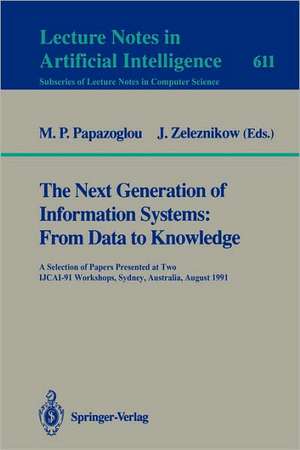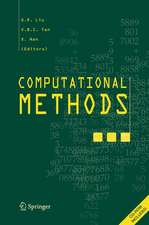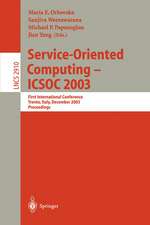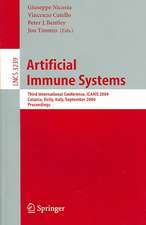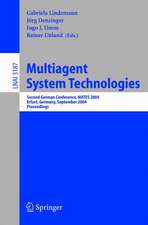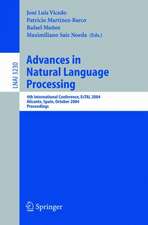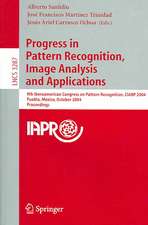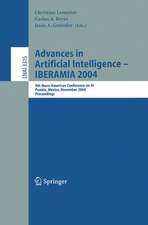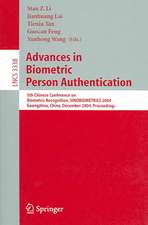The Next Generation of Information Systems: From Data to Knowledge: A Selection of Papers Presented at Two IJCAI-91 Workshops, Sydney, Australia, August 26, 1991: Lecture Notes in Computer Science, cartea 611
Editat de Michael P. Papazoglou, John Zeleznikowen Limba Engleză Paperback – 8 iul 1992
Din seria Lecture Notes in Computer Science
- 20%
 Preț: 1040.03 lei
Preț: 1040.03 lei - 20%
 Preț: 333.46 lei
Preț: 333.46 lei - 20%
 Preț: 335.08 lei
Preț: 335.08 lei - 20%
 Preț: 444.17 lei
Preț: 444.17 lei - 20%
 Preț: 238.01 lei
Preț: 238.01 lei - 20%
 Preț: 333.46 lei
Preț: 333.46 lei - 20%
 Preț: 438.69 lei
Preț: 438.69 lei -
 Preț: 440.52 lei
Preț: 440.52 lei - 20%
 Preț: 336.71 lei
Preț: 336.71 lei - 20%
 Preț: 148.66 lei
Preț: 148.66 lei - 20%
 Preț: 310.26 lei
Preț: 310.26 lei - 20%
 Preț: 567.60 lei
Preț: 567.60 lei - 20%
 Preț: 571.63 lei
Preț: 571.63 lei - 15%
 Preț: 568.74 lei
Preț: 568.74 lei - 17%
 Preț: 427.22 lei
Preț: 427.22 lei - 20%
 Preț: 641.78 lei
Preț: 641.78 lei - 20%
 Preț: 307.71 lei
Preț: 307.71 lei - 20%
 Preț: 574.05 lei
Preț: 574.05 lei - 20%
 Preț: 579.56 lei
Preț: 579.56 lei -
 Preț: 373.56 lei
Preț: 373.56 lei - 20%
 Preț: 330.23 lei
Preț: 330.23 lei - 20%
 Preț: 649.49 lei
Preț: 649.49 lei - 20%
 Preț: 607.39 lei
Preț: 607.39 lei - 20%
 Preț: 538.29 lei
Preț: 538.29 lei - 20%
 Preț: 1386.07 lei
Preț: 1386.07 lei - 20%
 Preț: 326.98 lei
Preț: 326.98 lei - 20%
 Preț: 1003.66 lei
Preț: 1003.66 lei - 20%
 Preț: 256.27 lei
Preț: 256.27 lei - 20%
 Preț: 632.22 lei
Preț: 632.22 lei - 20%
 Preț: 575.48 lei
Preț: 575.48 lei - 20%
 Preț: 747.79 lei
Preț: 747.79 lei - 20%
 Preț: 1053.45 lei
Preț: 1053.45 lei - 17%
 Preț: 360.19 lei
Preț: 360.19 lei - 20%
 Preț: 504.57 lei
Preț: 504.57 lei - 20%
 Preț: 172.69 lei
Preț: 172.69 lei - 20%
 Preț: 369.12 lei
Preț: 369.12 lei - 20%
 Preț: 346.40 lei
Preț: 346.40 lei - 20%
 Preț: 809.19 lei
Preț: 809.19 lei -
 Preț: 402.62 lei
Preț: 402.62 lei - 20%
 Preț: 584.40 lei
Preț: 584.40 lei - 20%
 Preț: 1159.14 lei
Preț: 1159.14 lei - 20%
 Preț: 747.79 lei
Preț: 747.79 lei -
 Preț: 389.48 lei
Preț: 389.48 lei - 20%
 Preț: 343.16 lei
Preț: 343.16 lei - 20%
 Preț: 309.90 lei
Preț: 309.90 lei - 20%
 Preț: 122.89 lei
Preț: 122.89 lei
Preț: 327.16 lei
Preț vechi: 408.95 lei
-20% Nou
Puncte Express: 491
Preț estimativ în valută:
62.61€ • 65.04$ • 52.01£
62.61€ • 65.04$ • 52.01£
Carte tipărită la comandă
Livrare economică 01-15 februarie 25
Preluare comenzi: 021 569.72.76
Specificații
ISBN-13: 9783540556169
ISBN-10: 3540556168
Pagini: 324
Ilustrații: IX, 315 p.
Dimensiuni: 155 x 233 x 17 mm
Greutate: 0.46 kg
Ediția:1992
Editura: Springer Berlin, Heidelberg
Colecția Springer
Seriile Lecture Notes in Computer Science, Lecture Notes in Artificial Intelligence
Locul publicării:Berlin, Heidelberg, Germany
ISBN-10: 3540556168
Pagini: 324
Ilustrații: IX, 315 p.
Dimensiuni: 155 x 233 x 17 mm
Greutate: 0.46 kg
Ediția:1992
Editura: Springer Berlin, Heidelberg
Colecția Springer
Seriile Lecture Notes in Computer Science, Lecture Notes in Artificial Intelligence
Locul publicării:Berlin, Heidelberg, Germany
Public țintă
ResearchCuprins
The next generation of information systems — from intelligence to distribution and cooperation.- A data and operation model for advanced database systems.- An object-oriented data model to represent uncertainty in coupled artificial intelligence — database systems.- Common architectures for databases and knowledge-based systems.- The construction of maintainable knowledge bases.- Adding qualitative reasoning to an organizational database for management decision support.- Building human-centered intelligent cooperative information systems with IKEA.- Database organisation for qualitative analysis: the NUDIST™ system.- Using a prolog engine to integrate multiple knowledge sources: the KCM/Help-desk project.- From relations to objects: A translation methodology for an object oriented front-end to RDBMSs.- A framework for cooperative adaptable information systems.- Problem solving in federative environments: The FRESCO concept of cooperative agents.- Heterogeneous database integration architecture based on a conversation theoretic skeleton.- Coarse-grained distributed agents for transparent access to remote information.- A forward-chaining information framework.- Using negotiation and coordination in multiagent Intelligent Cooperative Information Systems.- A distributed cooperative agents architecture for software development.- Knowledge selection in large knowledge bases.
